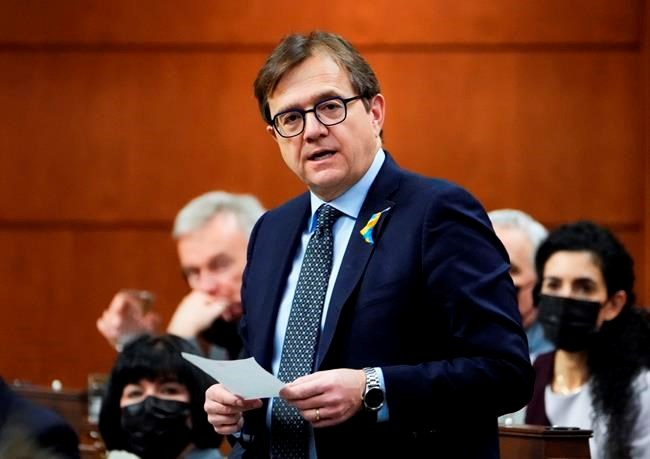OTTAWA — Natural Resources Minister Jonathan Wilkinson says it will be another week or two before Canada will know with certainty how much extra oil it can produce and ship to help offset bans on the use of fossil fuels from Russia.
But he says longer-term conversations about Canada partnering with Europe on renewable energy are likely more realistic and more lucrative.
Wilkinson is spending most of his time on the phone with G7 partners and energy industry executives hammering out how best to help Europe cut its reliance on Russia as a source of energy.
He spent most of last week at an energy conference in Houston, had multiple calls with U.S. Energy Secretary Jennifer Granholm and on Thursday, a two-hour call with G7 energy ministers. The Ukraine energy minister also joined part of that latter discussion.
"In the context of the discussions, not just with the Americans, but the Europeans as well, we have essentially asked each other, those of us that are oil and gas producers, to look at whatever we can do," he said in an interview.
All of these talks are leading toward March 23, when the International Energy Agency is hosting a meeting of energy ministers in Paris.
"My expectation is, by the time I go to Paris, we will have a pretty good view about what we may be able to do," he said. "I mean, we have constraints around pipeline capacity, obviously, but the ability to fully utilize that, at this point in time to help to stabilize global energy markets, and to assist our friends and allies in Europe is definitely something that we are looking at."
But even as the world's fourth largest oil producer, Canada's role in solving Europe's immediate fossil fuel needs is going to be limited. Canada exports about 3.6 million barrels of oil a day, but 97 per cent of it goes to the United States.
Environment Minister Steven Guilbeault estimated this week Canada might be able to increase output by 200,000 barrels a day. Tristan Goodman, president of the Explorers and Producers Association of Canada, said we might be able to do twice that amount "if we're lucky."
To replace all the oil it gets from Russia, Europe needs three million barrels a day.
Critics of the government argue the Liberals' inability to get any new pipelines built have constrained Canada's oil industry and now we can't help when there is a need.
Alberta Premier Jason Kenney said last week if U.S. President Joe Biden hadn't killed the Keystone XL pipeline a year ago, it could have been available to replace Russian oil by the end of this year.
The Liberals in Canada backed that project, but are skirting any forceful attempt to ask the Biden administration to revive it.
Wilkinson said he raised it with Granholm in Texas but Biden campaigned on a promise to cancel it, and Wilkinson said he doesn't see that changing.
"I certainly represented that Canada continues to be of the view that that project should have proceeded," he said.
Canada also has no strategic oil reserve like the United States to turn to in a pinch.
Wilkinson, however, said this is not a time to turn away from investments in clean energy to get more oil out the door. In fact he said his discussions with Europe are largely about transitioning to clean energy like hydrogen faster.
"We are in this transitional period where we need to address the immediate energy security crisis that is arisen because of Russia's brutal actions in Ukraine," he said. "But I think everybody understands that the world is and must turn toward a low carbon future."
Europe, he said, is moving faster to adopt electric vehicles than most of the world and oil demand on the continent is going to decline as a result.
"So I'm not sure that additional oil pipelines would have been, nor would be, a long term win," he said.
Canada and Europe are focusing heavily on what can be done to transition away from oil and natural gas more quickly. Hydrogen, which both countries want to adopt more heavily as a source of electricity, requires buildup of demand and production in Canada before exports can be contemplated, said Wilkinson.
But knowing what Europe is going to want and how quickly they might want it are critical," he said.
"So those are exactly the conversations I will be having in Paris," he said.
This report by The Canadian Press was first published March 12, 2022.
Mia Rabson, The Canadian Press



